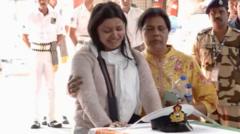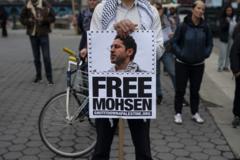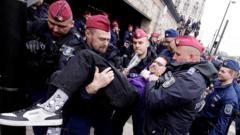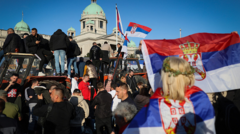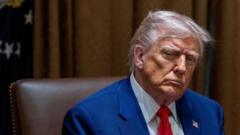Lawmakers and citizens express deep concern as military intervention recalls fears of history repeating itself in the nation.
Memories of Fear: South Korea's Martial Law Stirs Gwangju Tragedy

Memories of Fear: South Korea's Martial Law Stirs Gwangju Tragedy
As martial law is imposed in South Korea, echoes of the past surface among those who endured the Gwangju massacre.
In the early hours after President Yoon Suk Yeol's imposition of martial law on December 4, 2024, South Koreans found their hearts heavy with the weight of history. For decades, particularly those who were active during the pro-democracy movements of the 1980s, the specter of military rule evoked painful memories. Lawmaker Chung Chin-ook, who played an active role in the National Assembly on the night of the declaration, recalled his childhood in Gwangju during the massacre of demonstrators. "I immediately thought of 1980, and the fear and desperation we felt," he said, as he navigated past police to convene an emergency vote against the martial law.
As lawmakers voted unanimously to nullify the decree, special forces troops swooped onto the National Assembly lawn, treating the event like a hostile takeover. "It felt surreal, like we were living in a nightmare from four decades ago," Chung stated. Emotions surged as Chung witnessed the troops’ uniforms, reminiscent of the soldiers who had brutally suppressed protests in his youth. He felt compelled to act, stating, "There was an indescribable fear and rage, and the feeling that we cannot lose this time."
Similarly poignant were the feelings of Lee Jae-eui, who experienced the turmoil firsthand as a young college student during the Gwangju Uprising. He watched the live broadcasts of military forces entering the National Assembly from his home, struck by a bittersweet sense of déjà vu. "After democratization, I didn’t think this would happen again in our lifetime," remarked Lee, now 68. He lamented the stark reality of martial law resurfacing, underscoring, "The people know this is not lawful."
As South Koreans unite in their apprehension over the potential for bloodshed, they remain vigilant, driven by a strong desire not to allow history to repeat itself—a testament to both the resilience and the lingering scars of a turbulent past.
As lawmakers voted unanimously to nullify the decree, special forces troops swooped onto the National Assembly lawn, treating the event like a hostile takeover. "It felt surreal, like we were living in a nightmare from four decades ago," Chung stated. Emotions surged as Chung witnessed the troops’ uniforms, reminiscent of the soldiers who had brutally suppressed protests in his youth. He felt compelled to act, stating, "There was an indescribable fear and rage, and the feeling that we cannot lose this time."
Similarly poignant were the feelings of Lee Jae-eui, who experienced the turmoil firsthand as a young college student during the Gwangju Uprising. He watched the live broadcasts of military forces entering the National Assembly from his home, struck by a bittersweet sense of déjà vu. "After democratization, I didn’t think this would happen again in our lifetime," remarked Lee, now 68. He lamented the stark reality of martial law resurfacing, underscoring, "The people know this is not lawful."
As South Koreans unite in their apprehension over the potential for bloodshed, they remain vigilant, driven by a strong desire not to allow history to repeat itself—a testament to both the resilience and the lingering scars of a turbulent past.








